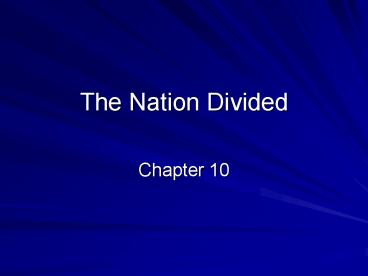The Nation Divided - PowerPoint PPT Presentation
1 / 13
Title: The Nation Divided
1
The Nation Divided
- Chapter 10
2
The Wilmot Proviso
- The Missouri Compromise did not apply to the
Mexican Cession - The Wilmot Proviso sought to ban slavery from the
territories acquired from Mexico - Southerners viewed the bill as an attack on
slavery
3
The Debate Over California
- Californias admission to the union led to bitter
arguments between North and South - Sen. Henry Clay proposed a compromise that could
end the North/South conflict - Sen. John Calhoun opposed the compromise the
North would continue to attack the Souths way of
life wanted Constitutional protection or
secession! - Sen. Daniel Webster supported Clay in order to
stop the sectionalism dividing the nation
4
The Compromise of 1850
- Authored by Henry Clay
- California admitted as a free state (N)
- Banned the slave trade in Washington D.C. (N)
- Popular Sovereignty would decide the slavery
issue in the Mexican Cession (S) - A stricter fugitive slave law was passed. (S)
- Northerners reacted to the compromise by
resisting the slave law and helping slaves
escape.
5
Uncle Toms Cabin
- Written by Harriet Beecher Stowe, who was
inspired by her hatred of the new fugitive slave
laws - Exposed Northerners to the evils of slavery
- Criticized by Southerners as false propaganda
6
The Kansas-Nebraska Act (1854)
- Written by Senator Stephen Douglas
- Organized the Louisiana Territory into the Kansas
and Nebraska Territories - Opened the territories to slavery through popular
sovereignty - Violated the Missouri Compromise, angering many
Northerners
7
Bleeding Kansas
- Pro-slavery and anti-slavery supporters rushed to
Kansas to impose their government violence soon
broke out - Pro-slavery supporters burn the town of Lawrence,
KS - Anti-slavery forces led by John Brown retaliate
in the Pottawatomie Massacre
8
The Caning of Sen. Charles Sumner
9
The Dred Scott Decision (1857)
- Scott sued for his freedom because he had lived
in the NW Territory where was banned - Chief Justice Roger B. Taney ruled that Scott had
no right to sue - He also wrote that the Missouri Compromise was
unconstitutional (legalized slavery in the
territories)
10
The Lincoln-Douglas Debates (1858)
- Abraham Lincoln ran against Stephen Douglas for
Senator - Douglas strongly defended the idea of popular
sovereignty called Lincoln a dangerous
abolitionist - Lincoln took a strong stand against the spread of
slavery - Douglas won by a slim margin
11
Raid on Harpers Ferry, Va. (1859)
- John Brown and other abolitionists hoped to seize
guns and lead a slave rebellion - U.S. troops led by Robert E. Lee capture Brown
the North mourns as he is hanged - Southerners fear there are more like Brown and
that the North wants to destroy their way of
life- Militias begin to form
12
The Election of 1860
- The Democratic party split, and Republican
Abraham Lincoln won with only 39.8 of the
popular vote - Lincoln did not win one Southern state showed
how divided the nation had become - The South felt they had no voice in government
S. Carolina secedes in Dec. 1860
13
Lincoln Takes Office (1861)
- In his inaugural address, Lincoln promises to not
touch slavery in the South - The newly formed Confederate States of America
began to seize federal property in the South - When Lincoln attempted to re-supply Ft. Sumter,
Confederates attacked and seized the fort













![❤️[READ]✔️ Crisis in a Divided Korea: A Chronology and Reference Guide PowerPoint PPT Presentation](https://s3.amazonaws.com/images.powershow.com/10048536.th0.jpg?_=20240605124)
![❤️[READ]✔️ Crisis in a Divided Korea: A Chronology and Reference Guide PowerPoint PPT Presentation](https://s3.amazonaws.com/images.powershow.com/10047907.th0.jpg?_=20240605041)
















